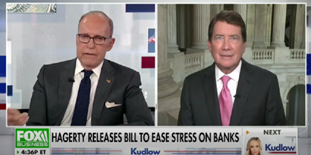WASHINGTON—United States Senator Bill Hagerty (R-TN), a member of the Senate Banking Committee, today joined Kudlow on Fox Business to discuss his legislation to address the current stress on the American banking system and restore confidence in the financial sector.

Partial Transcript
Hagerty on his legislation to relieve stress on the banking system: “What Kevin [O’ Leary] was talking about is an effort to try to address the intense pressure that’s on the regional banks right now and, frankly, the massive uncertainty that federal regulators have created as they’ve come in and, I think, completely mismanaged the auction of Silicon Valley Bank—the way they’ve handled Signature Bank—they’ve created a tremendous amount of uncertainty in the marketplace and you’ve seen what’s happening now, the pressure that’s on the regional bank industry. What it does is it addresses one of the issues that Kevin raised. Over the next 90 days, it actually green lights the merger of these banks, as long as the resulting bank is going to be well capitalized and not poorly rated. I think that will facilitate the process that he’s talking about, and it will allow price discovery to happen right away rather than having to stand back and wonder if regulatory approval is ever going to happen. That’s a huge break on bank mergers right now.”
Hagerty on the FDIC’s inconsistent management of mergers: “That’s exactly the problem. The uncertainty of dealing with the [Federal Deposit Insurance Corporation] is a real cloud in the marketplace right now. And if you need to achieve a merger, you want the type of efficiency that will result and want this market to settle down. We need to step in from a legislative standpoint and address it, and that’s what this [legislation] is aimed at doing […] The commercial deposits that Kevin was talking about, the non-interest-bearing deposits, are basically payroll accounts. That’s the biggest concern right now that the banks have. On a temporary basis, what we want to do is just provide a backstop so that those accounts don’t run. The same tool was used back in 2008 to great effect, and that’s the objective here—a temporary fix just to calm the markets right now. Some of my colleagues are calling for massive increases in FDIC insurance, etc. That’s not the direction to go.”
Hagerty on the need to stop big banks from poaching large clients from regional banks: “I think what [the bill is] going to do is just stop the concerns that exist right now among many of the middle-sized companies that are managing their payrolls, and they can’t go missing a payroll. And it’s the most painful point that really well-functioning regional banks have to deal with. The fact is that these too-big-to-fail banks are in a position right now where they’ve got an implicit government guarantee. Their loan officers, even though they’re being told not to, are reaching out to the regional banks that have great accounts, and they’re trying to recruit those regional banks’ clients to leave. This will help address that concern.”
Hagerty on his hearing with CEOs of failed banks: “The other thing that this bill does, Larry, is it changes the Least Cost Test. It forces the FDIC to take into account the long-term effect of failing a bank. If you look at what they did with SVB, they put us into uncharted waters because nobody knew where they stood on Monday. What we want these auctions to do is achieve a result. SVB actually had two bidders, yet the FDIC turned one down because they said the board hadn’t approved it. I asked Marty Gruenberg, who runs it, I said, ‘Did you call them back? Did you get the board’s approval?’ No answer to that. And then, when I asked about the next bid, he said ‘Well, the consideration wasn’t adequate.’ I said, ‘Well, what was your counteroffer?’ He said, ‘I’ll have to get back to you on that.’ And this is ridiculous. They should have closed that. We have been talking about a contained set of risks. Instead, they opened the entire marketplace up, and that’s why we’re having to address this now.”
###